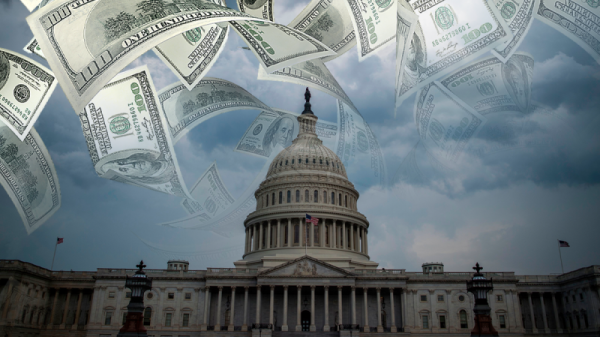The Supreme Court on Thursday agreed with a delay on proceedings that could lead to creating a second congressional district in Louisiana where Black voters make up a large-enough share of the electorate to have a significant chance of electing their preferred candidate.
The justices rejected requests by Black voters challenging a map passed by the state’s Republican-led legislature to allow a lower court judge to proceed in coming up with a new map. The order indicates that once litigation over the issue is completed, the Louisiana legislature might get a chance to draw a revised map.
The court’s one-sentence, unsigned order contains no instructions as to what should happen next. As is customary with emergency decisions, it contained no reasoning for refusing to put on hold an order from the U.S. Court of Appeals for the 5th Circuit, and no noted dissents.
But Justice Ketanji Brown Jackson wrote separately to reiterate a previous Supreme Court statement that the litigation should be resolved in time for the 2024 congressional elections. Louisiana is one of several states where battles over redistricting continue after the 2020 Census. The outcome of those battles could impact which party controls the House of Representatives after the 2024 elections.
The Louisiana case is something of a legal quagmire. Last year, U.S. District Judge Shelly Dick found that the map enacted by the Republican-led legislature dilutes the power of the state’s Black voters and probably violates the Voting Rights Act. While Black voters make up about a third of the state’s electorate, only one of six congressional districts is drawn to be conducive to electing a candidate who is the choice of Black residents.
The judge directed the legislature to draw a new map. But it did not, and the legal battle was renewed. In June 2022, the Supreme Court put the case on hold while it considered a similar one from Alabama; the 2022 congressional elections took place under the map approved by the legislature. Louisiana is represented in the U.S. House by five White Republicans and one Black Democrat, Troy A. Carter.
This summer, the Supreme Court ruled 5 to 4 that a lower court had been right to find the Alabama map discriminatory. Those judges have now imposed a new map that creates a second “opportunity” district for minorities among the seven congressional districts in Alabama, where about 27 percent of voters are Black.
The Supreme Court also released its hold on the Louisiana case, sending it back to lower courts. Although a 5th Circuit panel is reviewing Dick’s decision, she called for a hearing earlier this month to begin drawing a new map.
But at the state’s request, a different panel of the 5th Circuit stepped in with a command that Dick stop proceedings in the case, in part because she had not given the Louisiana legislature another opportunity to draw a new map.
The individuals and organizations challenging the legislature’s map called the 5th Circuit action an “extraordinary and unprecedented” circumvention of the district court’s docket.
A petition from lawyers representing voters and the state NAACP said the panel granted relief “that no party has asked for: an opportunity for the legislature to develop its own remedy for the likely vote dilution found by the district court.”
The legislature imposed its map over a veto from Gov. John Bel Edwards (D) and has not shown interest in creating a new one.
In his brief to the Supreme Court, Louisiana Attorney General Jeff Landry (R) said the 5th Circuit panel’s halt to lower court proceedings kept the case from devolving “into procedural chaos, making it impossible to resolve the Plaintiffs’ claims before the approaching congressional election cycle.”
Landry said the state would have been deprived of the chance to defend itself if Dick had been allowed to proceed, and “the Louisiana Legislature would have lost the opportunity to draw a new map in the first instance that conformed to the district court’s order.”
Louisiana’s qualifying deadline for the November 2024 election is about eight months away.
The Supreme Court on Thursday agreed with a delay on proceedings that could lead to creating a second congressional district in Louisiana where Black voters make up a large-enough share of the electorate to have a significant chance of electing their preferred candidate.
The justices rejected requests by Black voters challenging a map passed by the state’s Republican-led legislature to allow a lower court judge to proceed in coming up with a new map. The order indicates that once litigation over the issue is completed, the Louisiana legislature might get a chance to draw a revised map.
The court’s one-sentence, unsigned order contains no instructions as to what should happen next. As is customary with emergency decisions, it contained no reasoning for refusing to put on hold an order from the U.S. Court of Appeals for the 5th Circuit, and no noted dissents.
But Justice Ketanji Brown Jackson wrote separately to reiterate a previous Supreme Court statement that the litigation should be resolved in time for the 2024 congressional elections. Louisiana is one of several states where battles over redistricting continue after the 2020 Census. The outcome of those battles could impact which party controls the House of Representatives after the 2024 elections.
The Louisiana case is something of a legal quagmire. Last year, U.S. District Judge Shelly Dick found that the map enacted by the Republican-led legislature dilutes the power of the state’s Black voters and probably violates the Voting Rights Act. While Black voters make up about a third of the state’s electorate, only one of six congressional districts is drawn to be conducive to electing a candidate who is the choice of Black residents.
The judge directed the legislature to draw a new map. But it did not, and the legal battle was renewed. In June 2022, the Supreme Court put the case on hold while it considered a similar one from Alabama; the 2022 congressional elections took place under the map approved by the legislature. Louisiana is represented in the U.S. House by five White Republicans and one Black Democrat, Troy A. Carter.
This summer, the Supreme Court ruled 5 to 4 that a lower court had been right to find the Alabama map discriminatory. Those judges have now imposed a new map that creates a second “opportunity” district for minorities among the seven congressional districts in Alabama, where about 27 percent of voters are Black.
The Supreme Court also released its hold on the Louisiana case, sending it back to lower courts. Although a 5th Circuit panel is reviewing Dick’s decision, she called for a hearing earlier this month to begin drawing a new map.
But at the state’s request, a different panel of the 5th Circuit stepped in with a command that Dick stop proceedings in the case, in part because she had not given the Louisiana legislature another opportunity to draw a new map.
The individuals and organizations challenging the legislature’s map called the 5th Circuit action an “extraordinary and unprecedented” circumvention of the district court’s docket.
A petition from lawyers representing voters and the state NAACP said the panel granted relief “that no party has asked for: an opportunity for the legislature to develop its own remedy for the likely vote dilution found by the district court.”
The legislature imposed its map over a veto from Gov. John Bel Edwards (D) and has not shown interest in creating a new one.
In his brief to the Supreme Court, Louisiana Attorney General Jeff Landry (R) said the 5th Circuit panel’s halt to lower court proceedings kept the case from devolving “into procedural chaos, making it impossible to resolve the Plaintiffs’ claims before the approaching congressional election cycle.”
Landry said the state would have been deprived of the chance to defend itself if Dick had been allowed to proceed, and “the Louisiana Legislature would have lost the opportunity to draw a new map in the first instance that conformed to the district court’s order.”
Louisiana’s qualifying deadline for the November 2024 election is about eight months away.





















